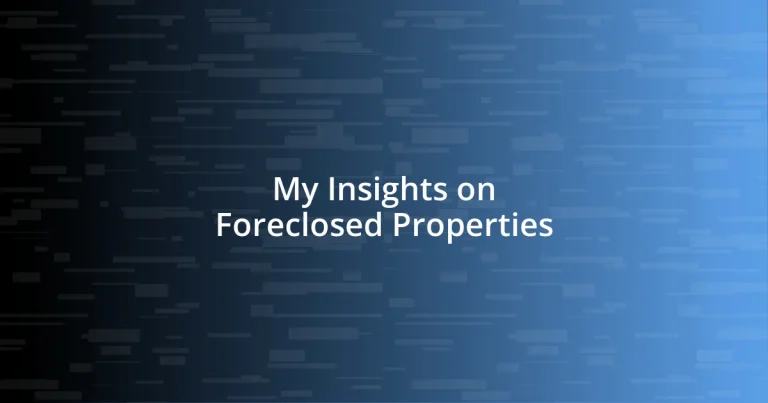Key takeaways:
- Foreclosure occurs when a homeowner defaults on mortgage payments, prompting the lender to reclaim the property, and understanding the process can help alleviate stress for those involved.
- Buying foreclosed properties comes with challenges, such as property condition, limited inspections, financing issues, and potential existing liens, requiring careful planning and patience.
- Successful foreclosure investments depend on thorough research, connecting with real estate professionals, and budgeting for unexpected costs after purchase.
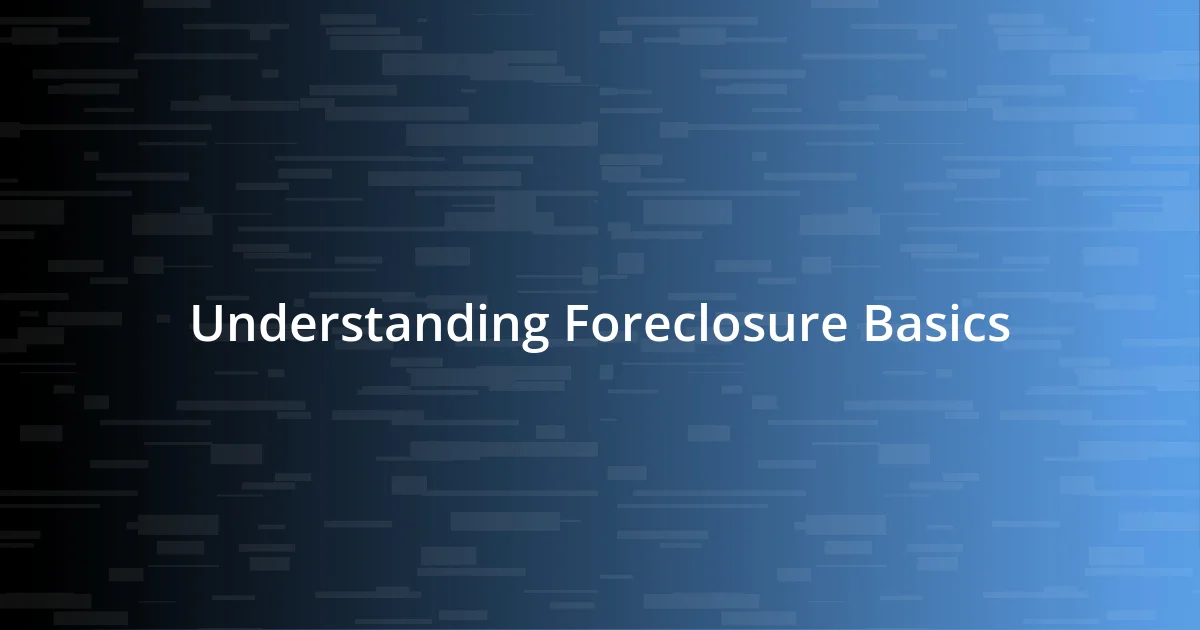
Understanding Foreclosure Basics
Foreclosure is often seen as a daunting process, but understanding its basics can demystify it. I remember when a friend of mine lost their home due to financial hardships. They felt overwhelmed, but once they grasped the timeline and steps involved, it empowered them to take action. Have you ever found yourself lost in a complex situation? That’s how foreclosure can feel at first.
At its core, foreclosure happens when a homeowner defaults on their mortgage payments, prompting the lender to reclaim the property. The emotions tied to this experience can be intense, ranging from frustration to fear. I once spoke with someone who had been through foreclosure, and what struck me was their resilience. They viewed it as a turning point rather than just a loss. It made me wonder: how often do we find the silver lining in difficult situations?
The process usually begins with a series of missed payments, leading to a notice of default. From that moment, homeowners often have a limited time to address the issue, which can be extremely stressful. I think it’s crucial to understand that support exists; there are counseling services and resources available. Have you ever sought help during a challenging time? Knowing you’re not alone can make a significant difference in navigating such a difficult journey.
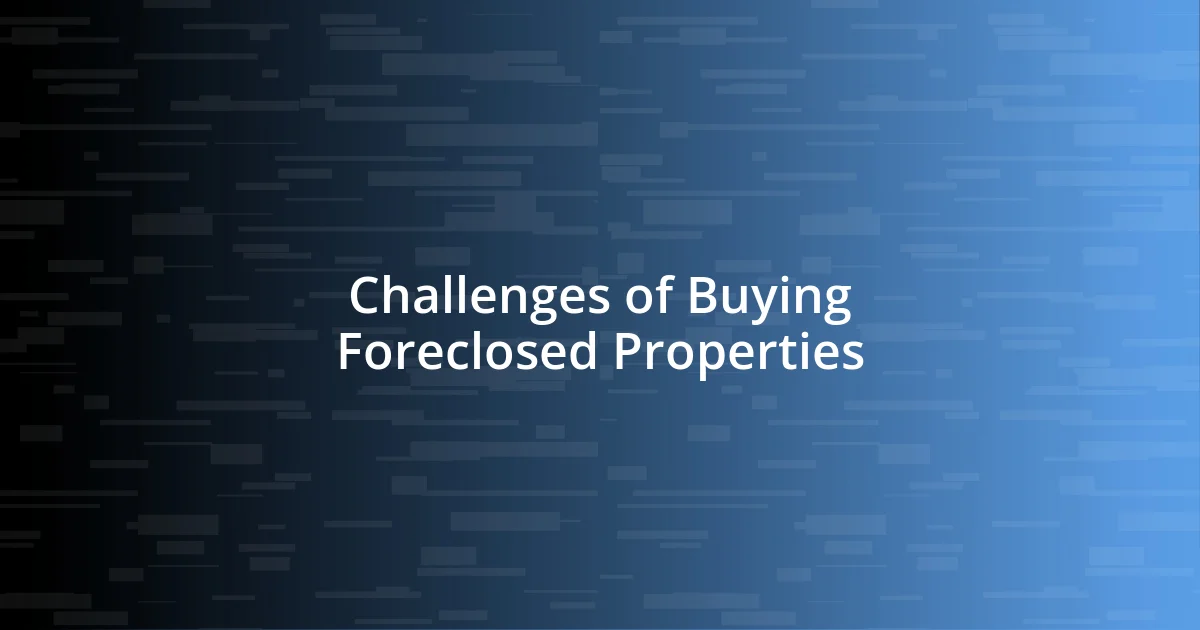
Challenges of Buying Foreclosed Properties
When diving into the world of foreclosed properties, potential buyers quickly encounter several hurdles. I remember going to a foreclosure auction once, feeling a mix of excitement and anxiety. The competition was fierce, and the properties often come with a host of unknown issues. It’s easy to get swept away in the bidding frenzy, but one must remember that purchasing a foreclosed home can feel like taking a leap into the unknown, given that many homes are sold “as-is.”
Here are some challenges to consider:
- Property Condition: Many foreclosures require significant repairs that buyers may not anticipate.
- Limited Inspection: Often, you can’t inspect the property thoroughly before buying, which can lead to unwelcome surprises.
- Financing Issues: Securing financing can be challenging, as many lenders have strict guidelines for foreclosed properties.
- Complicated Paperwork: The buying process can be lengthy and filled with bureaucratic red tape, leading to delays.
- Previous Liens: Sometimes, there are existing liens on the property that buyers must address, complicating ownership transfer.
Navigating through these challenges can really test your patience and resolve. I’ve seen countless investors come out the other side, but it’s a journey that requires careful planning and a good bit of fortitude. You have to be ready to handle unexpected hurdles while keeping your end goals in sight.
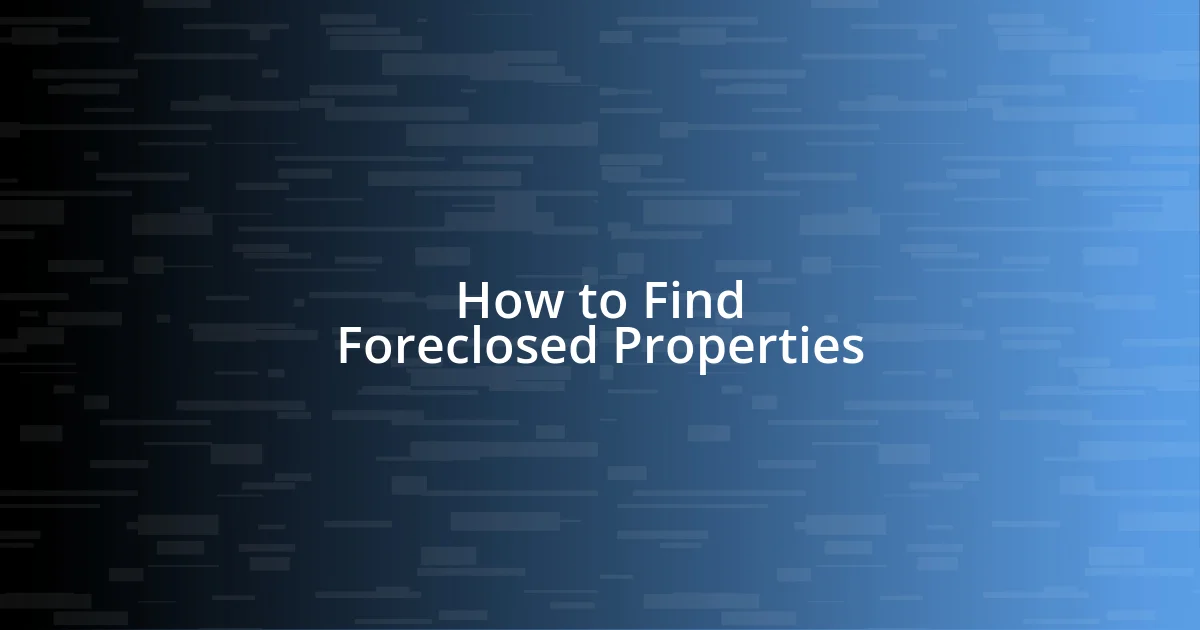
How to Find Foreclosed Properties
Finding foreclosed properties can feel like searching for a hidden treasure. One effective strategy is to start with online listings on platforms specializing in foreclosures. I remember when I stumbled upon a fantastic property through an online auction site. It was surprising how many listings were out there, just waiting to be discovered. Have you ever felt the thrill of finding something valuable when you least expected it?
In addition to online resources, I recommend connecting with local real estate agents who specialize in distressed properties. They often have insights and access to listings before they hit the mainstream market. A close friend of mine did this and landed a beautiful foreclosed home at a fraction of its market value. It’s all about having that edge through local expertise.
Finally, don’t overlook public records and foreclosure auctions. County offices maintain records of foreclosures, and attending live auctions can lead to unexpected opportunities. I experienced firsthand the adrenaline of bidding in an auction once; it was a mix of exhilarating and nerve-wracking. By leveraging various channels like these, the journey to finding a foreclosed property can become not just feasible, but exciting!
| Method | Description |
|---|---|
| Online Listings | Websites that specialize in foreclosures often list properties available for purchase. |
| Local Real Estate Agents | Agents can provide valuable insights and access to listings before they become widely known. |
| Public Records | County offices maintain legal records of foreclosures that can be reviewed for potential purchases. |
| Foreclosure Auctions | Attending auctions can provide opportunities to purchase properties directly, sometimes at lower prices. |
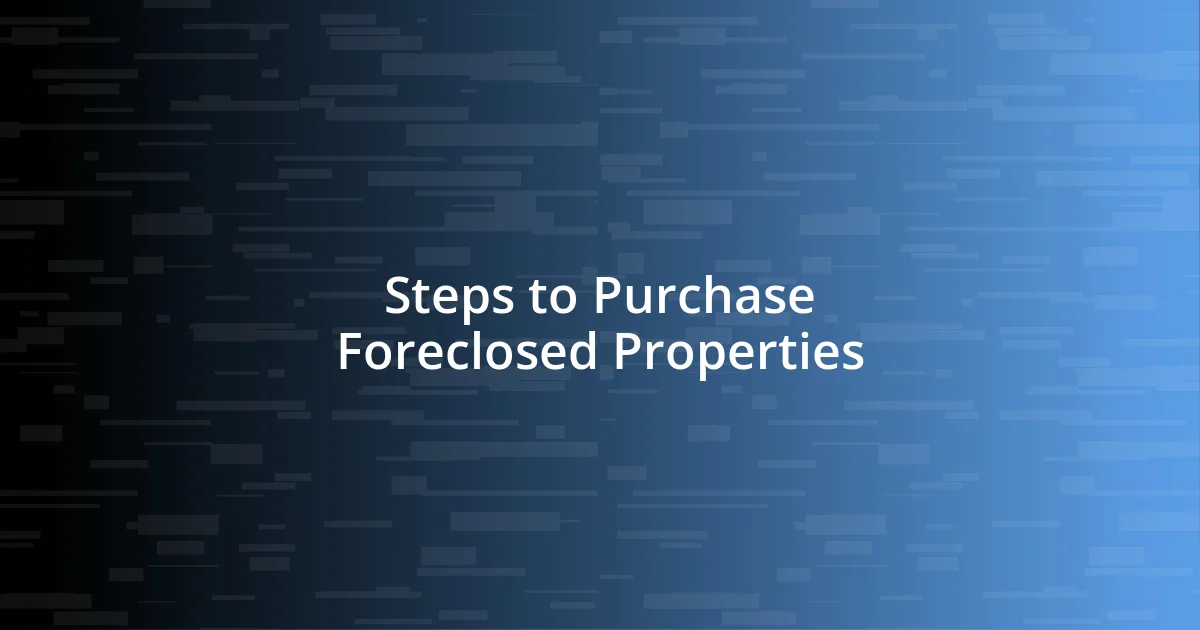
Steps to Purchase Foreclosed Properties
When you’re ready to purchase a foreclosed property, the first step is usually to secure financing. I’ve learned that having a pre-approval from a lender not only boosts your confidence but also strengthens your position when bidding. Imagine standing at an auction, knowing that you have your financial backing sorted out; it feels empowering, doesn’t it?
Next comes the actual bidding or negotiation process. I’ve participated in several auctions, and let me tell you, the energy in the room is electrifying! You need to stay calm and have your maximum bid in mind. It’s tempting to get swept up in the excitement, but maintaining discipline is key. Have you ever thought about how easy it can be to overspend in the heat of the moment? Trust me, sticking to your budget is non-negotiable.
Once you’ve secured your property, the paperwork can be a daunting task. I remember feeling overwhelmed by the sheer volume of documents I had to sign, all while ensuring that I understood every clause. It’s essential to review everything carefully, as this will bridge the gap between ownership and potential hidden issues further down the line. Can you relate to that feeling of crossing your fingers, hoping everything will go smoothly? In my experience, staying organized and asking questions can make this step much less stressful.
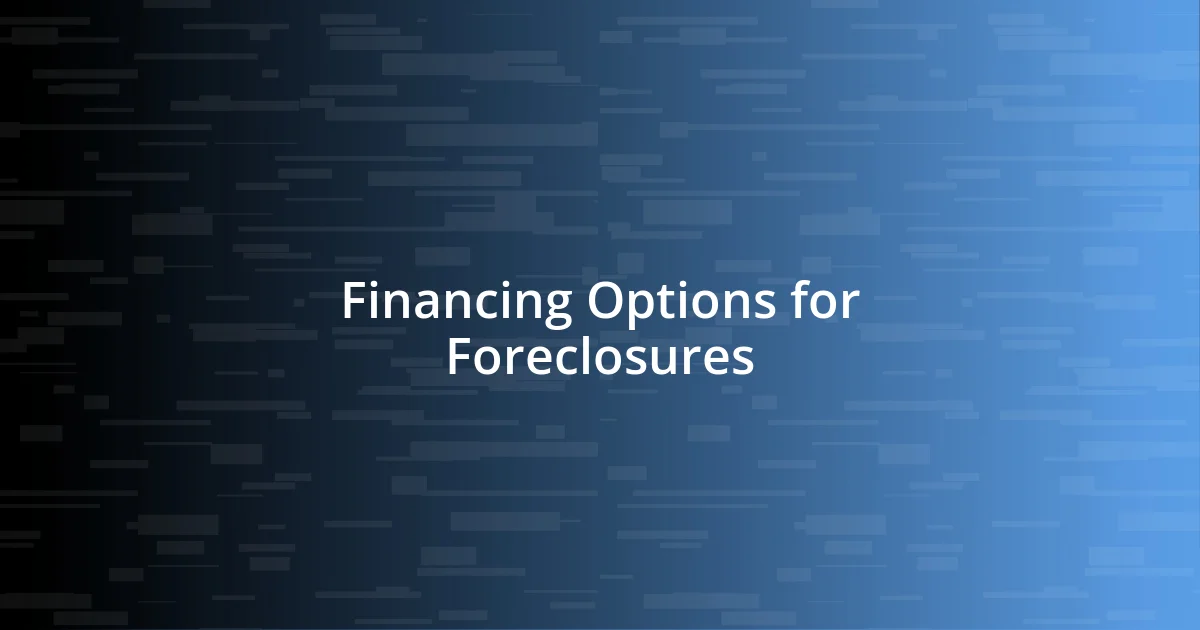
Financing Options for Foreclosures
Financing a foreclosed property can feel like navigating a maze, but there are several pathways you can take. One option I often advise is exploring an FHA loan, which is backed by the Federal Housing Administration. This type of loan typically requires a lower down payment and gives you the chance to invest in a property without breaking the bank. Have you considered how manageable lower payments could make your investment seem more attainable?
Another avenue worth considering is obtaining a hard money loan, especially if you’re looking to flip the property quickly. From my experience, hard money lenders focus on the property’s value rather than your credit history, which can be a game-changer if you don’t have a stellar credit score. It’s important, though, to be prepared for higher interest rates. I remember weighing the pros and cons during a recent flip; while the cost was steeper, the speed of funding enabled me to capitalize on a great deal before anyone else could.
Lastly, don’t forget about conventional loans. While these usually require a stronger credit profile, I once knew a buyer who secured one for a foreclosed property by demonstrating their financial stability with thorough documentation. It made me realize how important it is to be well-prepared and organized when going for financing. Have you got your financial documents in order? Trust me, it sets the stage for smoother transactions ahead.
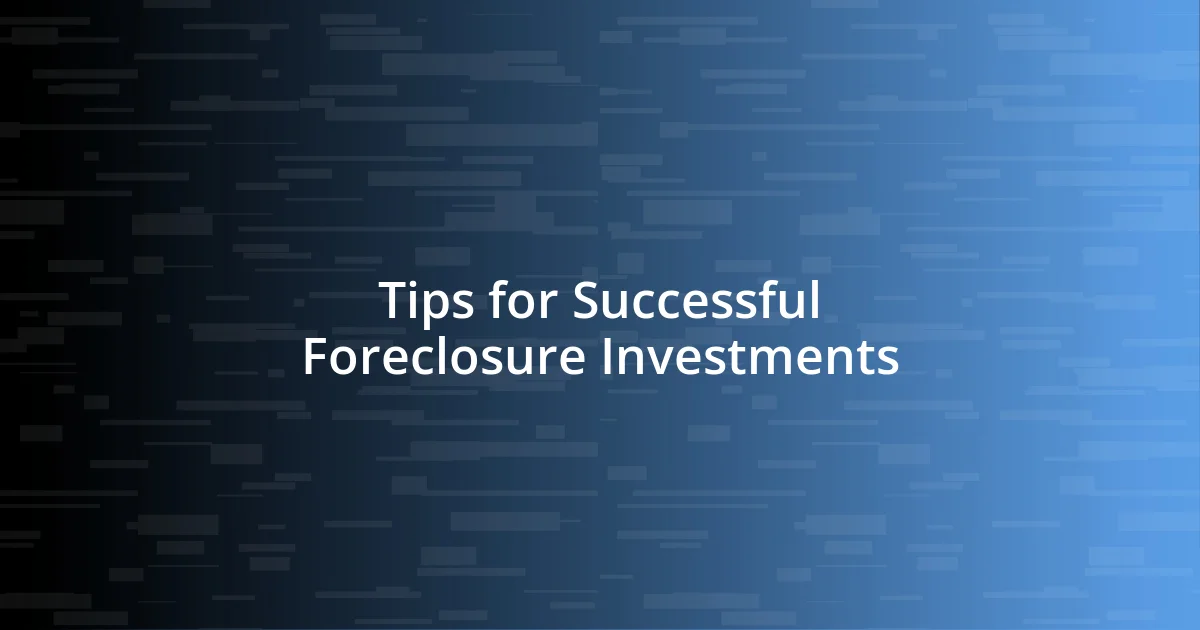
Tips for Successful Foreclosure Investments
One crucial tip for successful foreclosure investments is conducting thorough research on the property and the neighborhood. I’ve had experiences where I fell in love with a property at first sight, only to later discover some hidden issues like zoning regulations or ongoing construction. It’s important to ask yourself: Is this area growing, or could it be on the decline? Understanding local market trends can mean the difference between a thriving investment and a costly regret.
Another lesson I’ve learned is the value of connecting with professionals who understand the foreclosure landscape. I remember collaborating with a seasoned real estate agent who specialized in foreclosures; their insights were invaluable. They not only helped me navigate potential pitfalls but also identified promising opportunities that I might have missed on my own. Have you ever felt overwhelmed by choices? Surrounding yourself with knowledgeable individuals can significantly ease that pressure and guide you toward better decisions.
Finally, be prepared for unexpected costs after purchasing. I once underestimated the repairs needed in a property that seemed perfect initially. With older foreclosed homes, there can be hidden surprises like outdated electrical systems or plumbing issues. I suggest allocating a portion of your budget for these surprises, as it can ease financial stress. When was the last time you prepared for what might come out of left field? Being ready for the unexpected can empower you to tackle any challenges that arise head-on.












